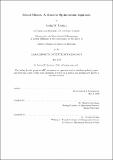School choice : a discrete optimization approach
Author(s)
Graham, Justin W.
Download1191901076-MIT.pdf (1.884Mb)
Other Contributors
Massachusetts Institute of Technology. Operations Research Center.
Advisor
Dimitris Bertsimas.
Terms of use
Metadata
Show full item recordAbstract
An equitable and flexible mechanism for assigning students to schools is a major concern for many school districts. The school a student attends dramatically impacts the quality of education, access to resources, family and neighborhood cohesion, and transportation costs. Facing this intricate optimization problem, school districts often utilize to stable-matching techniques which only produce stable matchings that do not incorporate these different objectives; this can be expensive and inequitable. We present a new optimization model for the Stable Matching (SM) school choice problem which relies on an algorithm we call Price-Costs-Flexibility-and- Fairness (PCF2). Our model leverages techniques to balance competing objectives using mixed-integer optimization methods. We explore the trade-offs between stability, costs, and preferences and show that, surprisingly, there are stable solutions that decrease transportation costs by 8-17% over the Gale-Shapley solution.
Description
Thesis: S.M., Massachusetts Institute of Technology, Sloan School of Management, Operations Research Center, May, 2020 Cataloged from PDF version of thesis. Includes bibliographical references (pages 32-34).
Date issued
2020Department
Massachusetts Institute of Technology. Operations Research Center; Sloan School of ManagementPublisher
Massachusetts Institute of Technology
Keywords
Operations Research Center.